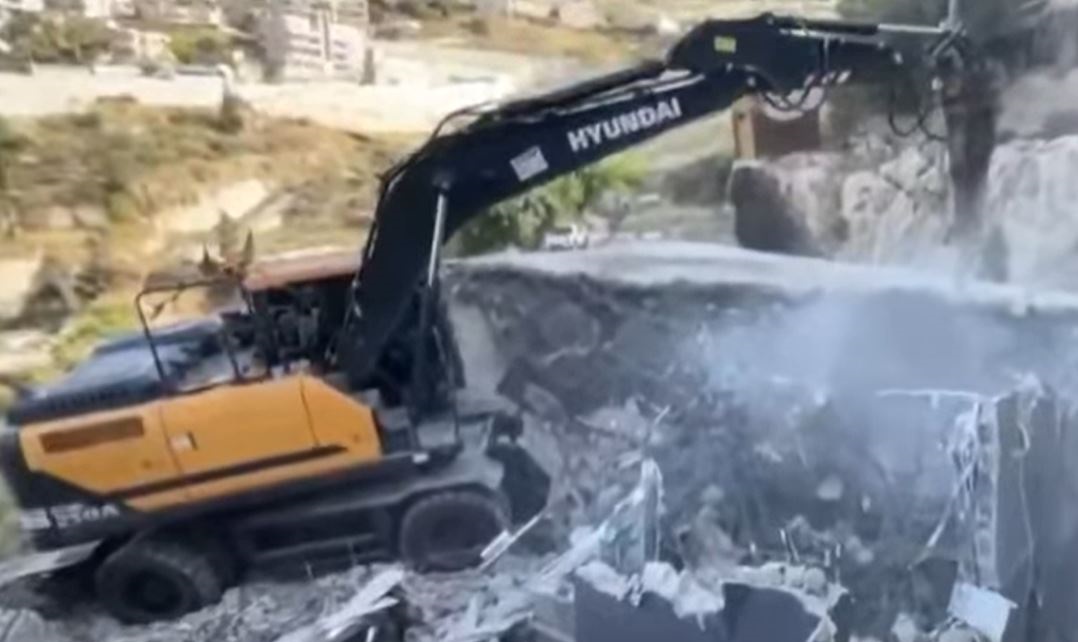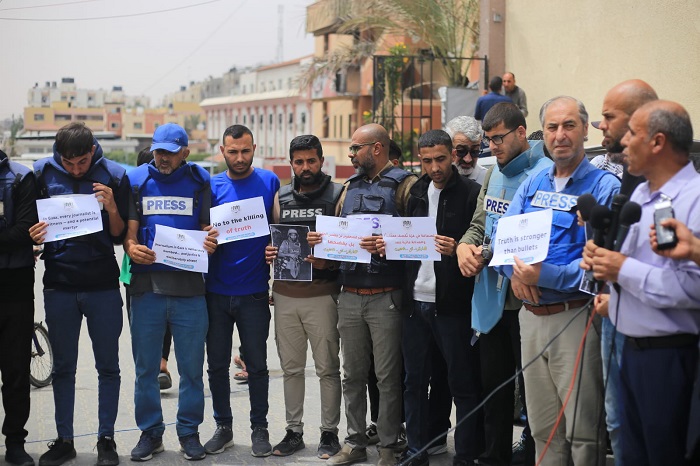By Malak Hassan
BRUSSELS, March 20, 2018 (WAFA) – Speakers at the Pledging Conference for the Desalination Facility Project in the Gaza Strip, which opened at the European Parliament headquarters in Brussels on Tuesday, called for quick implementation of the $600 million project to provide badly needed drinking water to Gaza’s two million people.
The European Commission and the Government of Palestine, in partnership with the Union for the Mediterranean (UfM), hosted in Brussels the international donor Pledging Conference to consolidate high-level political and financial support for the construction of a large-scale desalination plant and its associated water supply infrastructure in the Gaza Strip.
This project is a flagship one labelled by the 43 UfM Member States in 2011, and the Secretariat has made an important effort to push it forward.
He said that the conference “carries a message of hope to our people in Gaza while stressing that the international community is not neglecting their suffering and diligently working to design interventions to address the dire water situation in Gaza Strip.”
Commissioner for European Neighborhood Policy and Enlargement Negotiations Jonas Han said the donors‘ meeting for the desalination project is a program of support for the people of Gaza to help them obtain their basic needs.
He expressed hope that the Palestinians will reconcile their differences in order to support efforts to improve the quality of life of two million Palestinians in the Gaza Strip.
Mazen Ghuneim, the Palestinian Authority’s official in charge of the Water Authority, spoke at the conference about the dangers facing the Gaza Strip as a result of the water pollution, which is threatening their existence and their future.
He thanked the donors for their response to the appeal to salvage Gaza’s water, environment and health crisis.
European Investment Bank representative, Flavia Palenza, said that the financial support from the World Bank, the European Bank and the Islamic Bank demonstrates their commitment and trust in this project.
She said the desalination plant is a priority that aims to prevent a humanitarian disaster.
World Bank representative, Marina Vassal, urged the participants to accelerate the pace of work, expressing hope that an improvement in the infrastructure will change the living conditions of the population of Gaza. Drinking water is very important without which there will be no existence in the area, she said.
"The deterioration of political conditions has led to deteriorating in living conditions, so it is imperative to improve health conditions and ensure the welfare of the citizens of Gaza," she said.
Jordan’s representative Mohammed Tarwaneh stressed support for the Palestinians by all possible means to meet all their needs through a political solution, which is the two-state solution.
Representatives of Arab, Islamic, European countries and international organizations are attending the conference.
Following are the remarks of Prime Minister Rami Hamdallah at the conference:
It is a pleasure for me to be here with you at this very important Pledging Conference for the Desalination Facility Project in the Gaza Strip. I wish to extend my sincere thanks to the organizers and the European Union for hosting this important meeting in Brussels. I believe this pledging conference is extremely timely and incredibly important, considering the massive challenges and hardships facing our people in Gaza Strip.
This conference carries a message of hope to our people in Gaza while stressing that the international community is not neglecting their suffering and diligently working to design interventions to address the dire water situation in Gaza Strip. This brings to light the urgent need for the international community to engage and work with us to seek tangible solutions to the severe water situation in Gaza.
To give you an overall view of the current water situation in the Gaza Strip, I would like to point out that water resources have long been critically scarce and deficient in the Gaza Strip. As you probably know, ninety-seven percent of the water extracted from the coastal aquifer is now considered unfit for human consumption. There is over-extraction of water from the aquifer, thus allowing seawater from the Mediterranean Sea to seep into it, along with sewage and chemicals. Water in Gaza is not fit for domestic, agricultural, and industrial uses. This crisis ruins all fabrics of life in Gaza as water is one of the prime elements responsible for sustaining life on our earth.
To drink, most Gaza‘s families depend on water they buy from private vendors at a high cost and without quality control, or on imported water. A 2012 United Nations‘ study has warned that the aquifer of the Gaza Strip could become unusable by 2017, with the damage irreversible by 2020. The Palestinian Water Authority‘s assessment report on water quality, issued in January 2015, confirms that 96.5% of the aquifer water is yielding water, which fails all drinking water quality standards. This very precarious situation requires decisive interventions and immediate actions.
The only available water source is groundwater from the deteriorating Coastal Aquifer underlying the Gaza Strip, as well as Israel and Egypt. The sustainable yield of the aquifer in the Gaza Strip is around 55 million cubic meters (MCM)/year. However, about two million people in Gaza consume in excess of 200 MCM/year from the aquifer. This is thus taking approximately four times as much as the aquifer can sustainably recharge each year. The sole natural water source is the coastal aquifer and suffers from annual deficit of around 120 MCM.
In addition, the over-pumping of groundwater has led to damage of the trans-boundary aquifer due in part to a large increase in groundwater salinity following from seawater intrusion into the aquifer from the Mediterranean Sea. Levels of salinity found in the aquifer under Gaza have risen continuously over the last two decades, and are now far in excess of the World Health Organization standards for drinking water. The deterioration of the trans-boundary aquifer has negative impacts on neighboring countries, which share an interest in protecting this shared source of fresh water.
To address this dire situation, seawater desalination is one of the strategic options chosen by my government to help in providing our people in Gaza with safe drinking water. We have consistently emphasized the desalination project as a priority infrastructure project in all our water sector strategies and have been also included in our National Policy Agenda 2017-2022.
Moreover, in September 2013, in its report to the AHLC‘s meeting in New York, the Office of the United Nations Special Coordinator reiterated the full support of the United Nations to the project noting: "Large-scale desalination has been identified as the only viable alternative for drinking water supply in the Gaza Strip."
Ladies and Gentlemen,
The main objective of the project is to alleviate the health crises threatening our Gaza‘s people through the improvement of water supplies from quality and quantity prospective. The project also aims at creating additional high quality water and improvement of its distribution to a better safe quality and fair allocations through the National Water Carrier.
It is worth highlighting here that the project will contribute to the political stability of the region as the water scarcity issue can have grim repercussions and spark further tensions. Moreover, the desalination of seawater is essential to curb over-extraction of groundwater from the coastal aquifer, to prevent an environmental disaster, and to start the slow process of aquifer restoration in Gaza Strip. Therefore, the project is pivotal in reducing the pollution in the Eastern Mediterranean area.
The project has two components: the desalination plant itself and the associated works that are required to ensure efficient transmission and distribution of water. The cost of constructing a central station for water and its accessories is 562 million euros, while solar energy will be set up to operate the plant on an area of 100 dunums south of the Gaza Strip.
I would to mention in this regard that there have been a number of areas where progress has been realized. Firstly, we have secured the land for the desalination plant and completed the construction of a fence to protect it. Secondly, we have enhanced the governance arrangements required for this project. This includes the preparation of the terms of reference for the four main committees and their relevant stakeholders. Moreover, the World Bank‘s consultants completed the detailed design for the associated works project in October 2017.
In August 2017, we provided detailed lists to Israel for all the materials required for the associated works. I seize this opportunity to call on Israel to facilitate the entry of the materials required for the project. This is very necessary so that the implementation of the project can progress rapidly and smoothly with no delays or any further impediments.
Ladies and Gentleman,
A number of donors have already indicated their intention to provide financial support to the project, and they deserve our deepest gratitude and respect. The Islamic Development Bank pledged to contribute 50% of the total cost of the entire project. The European Union promised to provide 70 million euros, while France pledged 10 million euros. The Government of Kuwait also committed, through the sector reconstruction program, $ 60 million for the implementation of part of the carrier line as a supplementary project for the central water station.
But this is not enough as more resources are needed to allow us to complete the project. We indeed call on you to generously provide the necessary financial support to ensure that the project is completed successfully and professionally. You have the opportunity to show your generous support at this conference as we count on your continued generous support to help our people in Gaza Strip and solve the dire water situation. To achieve this, we need your steadfast and generous support.
The urgency for the desalination project in Gaza has increased with the dire crisis in Gaza related to inadequate water resources with negative and appalling impacts on human health and all aspects of life. It is saddening that we are in 21st century and people of Gaza have no to access to fresh water. This is unacceptable, inhumane, and tragic, and, must not be allowed to continue.
It is very essential and obligatory to support the lives and livelihoods of millions of people in Gaza who deserve to drink fresh water and have a dignified life. The alleviation of our people‘s suffering is our first priority, and our cooperation can make great and transformational differences in their lives.
M.K.











